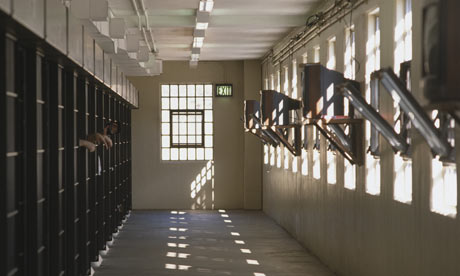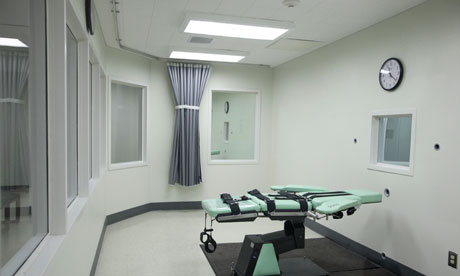| View previous topic :: View next topic |
| Author |
Message |
faceless
admin

Joined: 25 Apr 2006
|
 Posted: Wed Oct 21, 2009 5:02 pm Post subject: Death Sentence Posted: Wed Oct 21, 2009 5:02 pm Post subject: Death Sentence |
 |
|
|
|
 Life after death row
Erwin James finds survivor John Thompson campaigning to help other former prisoners who have been exonerated and released from death row
Life after death row
Erwin James finds survivor John Thompson campaigning to help other former prisoners who have been exonerated and released from death row
Death-row survivor John Thompson is angry, but not bitter. Which is remarkable, given that the prosecutor in his original trial for murder in 1984 deliberately withheld evidence that proved he was innocent. "I'm angry," he says, "because that man was trying to murder me. He knew I did not commit that crime, had the evidence to prove it, but it made no difference. He was going to have me killed in the chair to further his own career." Of all the cases of death-row prisoners who have been exonerated in recent years, Thompson's is one of the most troubling. Jerry Deagan, the prosecutor in question, only confessed that he had concealed the blood evidence that would have absolved Thompson when he found he was dying of liver cancer, 11 years after Thompson's conviction. In an attempt to clear his conscience, Deagan told his colleague, Mike Riehlmann, what he had done.
But even when Deagan died, it was almost five years before Riehlmann came clean and earned a brief suspension from Louisiana's Supreme Court for his "inaction". After 14 years on death row and seven execution dates, Thompson was given a retrial in 2004. The jury took just a few minutes to acquit him, and later he walked out of Louisiana's Angola State prison with just $10 in his pocket for his trouble. Now he campaigns against the death penalty. And not just for those who might be innocent. "There is nothing about justice in death penalty cases in the US," he told me at the annual conference of Lifelines (www.lifelines-uk.org), the organisation that arranges pen-friends for those on death row, where he and I were guest speakers. "It's all about votes and careers."
He opened his briefcase and took out a large photograph of a burly-looking man wearing gold-rimmed spectacles. The man, Jim Williams, was the senior prosecutor who oversaw Thompson's original trial. In the picture, Williams wears a look of pride and stands behind a large desk, upon which stands a small model of an electric chair. Attached to the chair are the photographs of five black men. Thompson's picture, in the centre, is the largest. "He was especially proud to send me to the chair," says Thompson, "and it was all based on lies."
Now none of the men in the model chair remain on death row. Two were exonerated, two had their sentences commuted to life and one is awaiting a retrial. "Because the officials who do that work are all elected, it means that the whole process is political. It is the political pressure on these people to convict and to secure the death penalty that leads to the kind of corruption that almost killed me," says Thompson. "And do you know what really angers me? It's when these people, [the prosecutors] are found out. When those on death row are found to be innocent, nobody in the prosecutor's office ever faces charges, nobody has to pay. A slap on the wrist for 'malfeasance' and then they're back at work doing the same old thing."
Concerned about the lack of support for other death-row survivors who had been exonerated and released, Thompson founded Resurrection after Exoneration (www.r-a-e.org/stories), a campaigning body that supports those affected while they adjust to life back on the outside. Exonerees are many. In the last 30 years, 135 people have been exonerated from death row in 25 states – since 1990, 26 were from Louisiana alone. Has Thompson got over what happened to him yet? "No sir," he says quietly, "not completely. I might get over it. But to tell you the truth, I don't want to get over it. I want it to stay with me, to keep driving me to resolve this thing."
---------------
What a story... this case alone proves that the death-penalty is unworkable. How many others have been killed to further careers? |
|
| Back to top |
|
 |
pirtybirdy
'Native New Yorker'

Joined: 29 Apr 2006
Location: FL USA
|
 Posted: Thu Oct 22, 2009 2:19 am Post subject: Posted: Thu Oct 22, 2009 2:19 am Post subject: |
 |
|
|
|
| I'll always be for the death penalty, but I don't want people being sentenced to death so easily on a simple eyewitness alone. In those cases, better to be safe than make a mistake you can't reverse. |
|
| Back to top |
|
 |
faceless
admin

Joined: 25 Apr 2006
|
 Posted: Thu Oct 22, 2009 2:27 am Post subject: Posted: Thu Oct 22, 2009 2:27 am Post subject: |
 |
|
|
|
Most mistakes in your daily life don't involve sending someone to their death though - and if they do then you should be held accountable.
Anything else is blind obedience in the name of the nation/corporation. |
|
| Back to top |
|
 |
faceless
admin

Joined: 25 Apr 2006
|
 Posted: Tue Mar 30, 2010 3:22 pm Post subject: Posted: Tue Mar 30, 2010 3:22 pm Post subject: |
 |
|
|
|
As soon as I saw this headline I thought it must be something to do with money...but it's something at least. Though I imagine someone somewhere is profitting from keeping them in jail. |
|
| Back to top |
|
 |
faceless
admin

Joined: 25 Apr 2006
|
 Posted: Fri Nov 22, 2013 2:36 pm Post subject: Posted: Fri Nov 22, 2013 2:36 pm Post subject: |
 |
|
|
|
 I was Virginia's executioner from 1982 to 1999. Any questions for me?
I was responsible for putting 62 inmates to death in Virginia. I regret it deeply and now campaign to end capital punishment
I was Virginia's executioner from 1982 to 1999. Any questions for me?
I was responsible for putting 62 inmates to death in Virginia. I regret it deeply and now campaign to end capital punishment
Jerry Givens
21 November 2013
Jerry Givens worked for 25 years for Virginia's department of corrections. He was the state's executioner from 1982 to 1999 and administered the death penalty to 62 inmates, some by lethal injection and some by electrocution. For many years, even his own family did not know the truth about his job. Now Jerry campaigns to end capital punishment. He is the author of Another Day Not Promised and is on the board of Virginians for Alternatives to the Death Penalty. Today he opens up on Comment is free about his old job, what caused him to change his mind and the realities of America's criminal justice system.
Post questions for Jerry in the comments below. He will respond to as many as he can later today.
1. Can you describe what the day was like when you had to perform an execution?
On the day before, we begin what we call a 24-hour "death watch". Normally I would be there starting at 9pm during the death watch and spend the night at the institution in case something would occur during that period. Everything is reported that happens. We have security guys for the "death team", a special group of people who simply maintain security for the death chamber. Inmates arrive at Greensville, the institution with the death chamber, 15 days prior to the execution date. For those days, we have to provide security around the clock.
We would test the equipment frequently, whether we had an execution or not. But on the day of an execution or during that week, we would have all sorts of training. We train for the worst. We train for the man to put up resistance. Most would not, but sometimes it would get rough.
On the day of the execution, I could almost tell if the condemned had already accepted that this was it for them or not. Some folks resigned themselves to it. I would try to see if the inmate is at that level and if he's ready or not. If there's tension in the building, you could sense it. He would prepare and get things together for last meal and who he wanted to see.
Most of the time, during the actual execution, I'm back behind the partition, behind a curtain with my equipment. I'm alone as the executioner, but we had a crew that would go and escort the inmate and place him on the gurney or in the chair and strap him down and a doctor who would confirm the heart had stopped after.
2. Can you explain the difference between the types of executions you had to perform?
When I first started, it was only death by electrocution. Electrocution consists of 2,400 to 3,000 volts. The condemned receives 45 seconds of a high volt shock and 45 seconds of the low cycle. It takes about 2.5 minutes. Then there is a five minute grace period to let the body cool down. Then a physician goes in the room with a stethoscope to see if there is a heartbeat. Back in the mid-1990s, Virginia decided to go with lethal injection instead. That consists of seven tubes that are injected into the left arm. Three tubes of chemicals and four that are flush. So you administer the first chemical (sodium pentothal), then a flush, then the second chemical (pancuronium), then a flush, then the third chemical (potassium chloride) and then a final flush at the end. You have to keep people who remove the body from being exposed to chemicals.
If I had a choice, I would choose death by electrocution. That's more like cutting your lights off and on. It's a button you push once and then the machine runs by itself. It relieves you from being attached to it in some ways. You can't see the current go through the body. But with chemicals, it takes a while because you're dealing with three separate chemicals. You are on the other end with a needle in your hand. You can see the reaction of the body. You can see it going down the clear tube. So you can actually see the chemical going down the line and into the arm and see the effects of it. You are more attached to it. I know because I have done it. Death by electrocution in some ways seems more humane.
3. What caused you to change your opinion on the death penalty?
It's not something that I enjoyed. I never enjoyed none of it. When I accepted the job, there was nobody on death row in Virginia. A person had to be foolish to commit that kind of crime knowing they could be put to death. It's like volunteer suicide. I never thought that 100-some people would end up on death row. I had no idea that I would actually execute 62 people. I didn't know that when I signed up.
Even when I was on the job, I was always asking, what can I do to prevent these guys before they get there? I used to bring kids down from schools. I would allow the kids to sit in the chair and explain that I want to see kids get an education and remove themselves from violence or you'll end up here. I know it helped. I used to get letters. They would write back saying thank you for steering them in the right direction. I also never understood why we would spend money on the death penalty instead of spending money to try to prevent these people from getting in the system in the first place.
When I found out they had some innocent people on death row that came almost hours before I had to take their life, then I knew we had to change. That would be on me for the rest of my life.
I honestly believe God stepped in and said enough is enough. I was subpoenaed to appear before a grand jury. I remember the day because I was supposed to have an execution soon, March 16, 1999. They were after a friend of mine. To make a long story short, the grand jury said I was involved in money laundering and perjury for buying cars for my friend who obtained the money illegally. I told them I thought he had straightened out. But I did 57 months in a federal institution. I knew then that the system wasn't right. I don't believe I had a fair trial, so I realized maybe some of the people I executed weren't given a fair trial.
4. What kind of training did you need to be an executioner?
It was complicated for me. When I was asked, death row was empty in Virginia. I was thinking to myself, I didn't agree, but I would give it some thought. Then after the first execution in 1982 that I assisted, the guy who did it got sick. He just stopped working and retired. And I took over from there. We had so many executions so close together. After the first one, I did it by myself in 1984. I always said once I get to 100, I was going to stop. I'm glad I never got that far.
I guess I had a reputation in the prison system. I would put my life on the line for a lot of inmates and people. I would go in and fight guys with my bare hands to try to stop the violence. I did my job. I saw it as saving the lives of people, stopping violence. One day I was saving people. Then I was taking lives. I had to transform myself into someone who could go and take the life of another person. It's not an easy task to do.
When I accepted the job, I never told my wife or kids or anybody. I didn't want them to go through anything I had to go through. If I told someone, they would tell someone. It would have been like a snowball and gotten bigger and bigger and everyone would know exactly what I was doing.
5. What was your annual salary when working in the Virginia prison system? Were you paid extra to perform executions?
We got roughly $39,000 to $50,000. It depended what pay grade you were at as a correctional officer. When I resigned, it was closer to $50,000. We got benefits, but I did not get any extra pay as the executioner. Sometimes, I think if I hadn't been selected to be the executioner, then I think that I would have worked my 27 years without any problems and settled for my retirement. But when I was forced to resign, it took away everything. I lost my pension.
If I had known what I had to go through as an executioner, I wouldn't have done it. You can't tell me I can take the life of people and go home and be normal.
6. What's the biggest mistake you've ever made while working?
Biggest mistake I ever made was taking the job as an executioner. Life is short. Life only consists of 24 hours a day. Death is going to come to us. We don't have to kill one another.
comments are here - CLICK |
|
| Back to top |
|
 |
|
|
|
|
You cannot post new topics in this forum
You cannot reply to topics in this forum
You cannot edit your posts in this forum
You cannot delete your posts in this forum
You cannot vote in polls in this forum
You cannot attach files in this forum
You cannot download files in this forum
|
Couchtripper - 2005-2015
|




